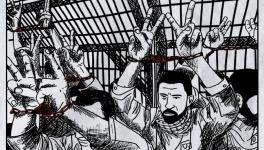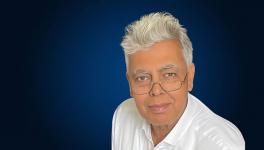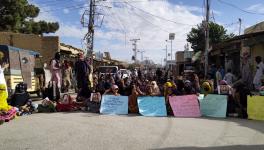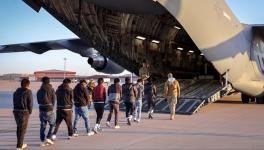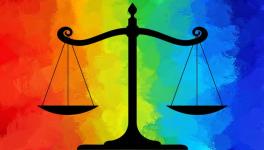Hundreds of Anti-govt Protesters Break Into Sri Lankan President Rajapaksa’s Official Residence
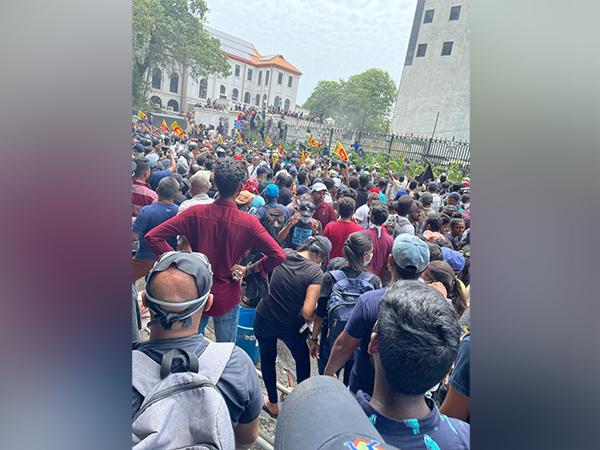
protestors entered President's house in Sri Lanka. Image Courtesy: Twitter
Colombo: Hundreds of Sri Lankan protesters, demanding the resignation of President Gotabaya Rajapaksa, on Saturday stormed into his official residence in central Colombo’s high-security Fort area after breaking the barricades, as people took to the streets protesting against the government over the nation's worst economic crisis in recent memory.
President Gotabaya Rajapaksa, who has been facing calls for resignation since March, was using the President’s House as his residence and office since protesters came to occupy the entrance to his office in early April.
Insiders say the President was moved out of the house on Friday as the build-up to Saturday's protest was gathering.
A massive gathering of protesters broke through barricades even as police used tear gas and water cannons and opened fire to disperse them.
Meanwhile, Prime Minister Ranil Wickremesinghe on Saturday called for an urgent meeting of political party leaders to discuss the crisis in the country caused by the public protest, calling for Gotabaya Rajapaksa's resignation.
A statement from Wickremesinghe's office said he had called on party leaders for an urgent meeting, asking the Speaker to summon an urgent meeting of Parliament.
Protesters who climbed the walls of the President’s House are now occupying it without damaging any property or indulging in acts of violence.
At least 30 persons, including two police officers, were injured during the ongoing protests and were admitted to the National Hospital in Colombo.
The protesters also clashed with the railway authorities in provincial towns of Galle, Kandy, and Matara as the demonstrators forced authorities to operate trains to Colombo.
Large contingents of police, special task force, and the Army had been deployed around the area.
The organisers of the movement ‘Whole country to Colombo’ said people were walking from the suburbs to join the protesters at Colombo Fort.
Protesters said they won’t relent until Gotabaya Rajapaksa quits the presidency.
Sri Lankan Police had earlier in the day lifted the curfew imposed in seven divisions in the country’s Western Province, including Colombo, ahead of the planned anti-government protests, after coming under sustained pressure from top lawyers’ associations, human rights groups, and political parties.
The curfew was imposed in seven police divisions in the Western Province, which included Negombo, Kelaniya, Nugegoda, Mount Lavinia, Colombo North, Colombo South, and Colombo Central with effect from 9 pm on Friday night until further notice, police said.
The Bar Association of Sri Lanka had protested the police curfew, terming it “illegal and a violation of fundamental rights”.
“Such curfew is blatantly illegal and a violation of the fundamental rights of the people of our country who are protesting against President Gotabaya Rajapakse and his Government over its failure to protect their basic rights,” it said.
The body cautioned that the curfew intended to stifle freedom of expression and dissent, which would gravely harm Sri Lanka’s economy and its social, political, and international standing.
The Human Rights Commission of Sri Lanka called the police curfew a gross violation of human rights.
On Friday, police in Sri Lanka’s commercial capital Colombo imposed a curfew after firing tear gas and water cannons on student protesters ahead of a weekend rally, as public outrage escalated over the island nation’s worst economic crisis in seven decades.
Sri Lanka, a country of 22 million, is under the grip of an unprecedented economic turmoil, the worst in seven decades, crippled by an acute shortage of foreign exchange that has left it struggling to pay for essential imports of fuel and other essentials.
Get the latest reports & analysis with people's perspective on Protests, movements & deep analytical videos, discussions of the current affairs in your Telegram app. Subscribe to NewsClick's Telegram channel & get Real-Time updates on stories, as they get published on our website.












